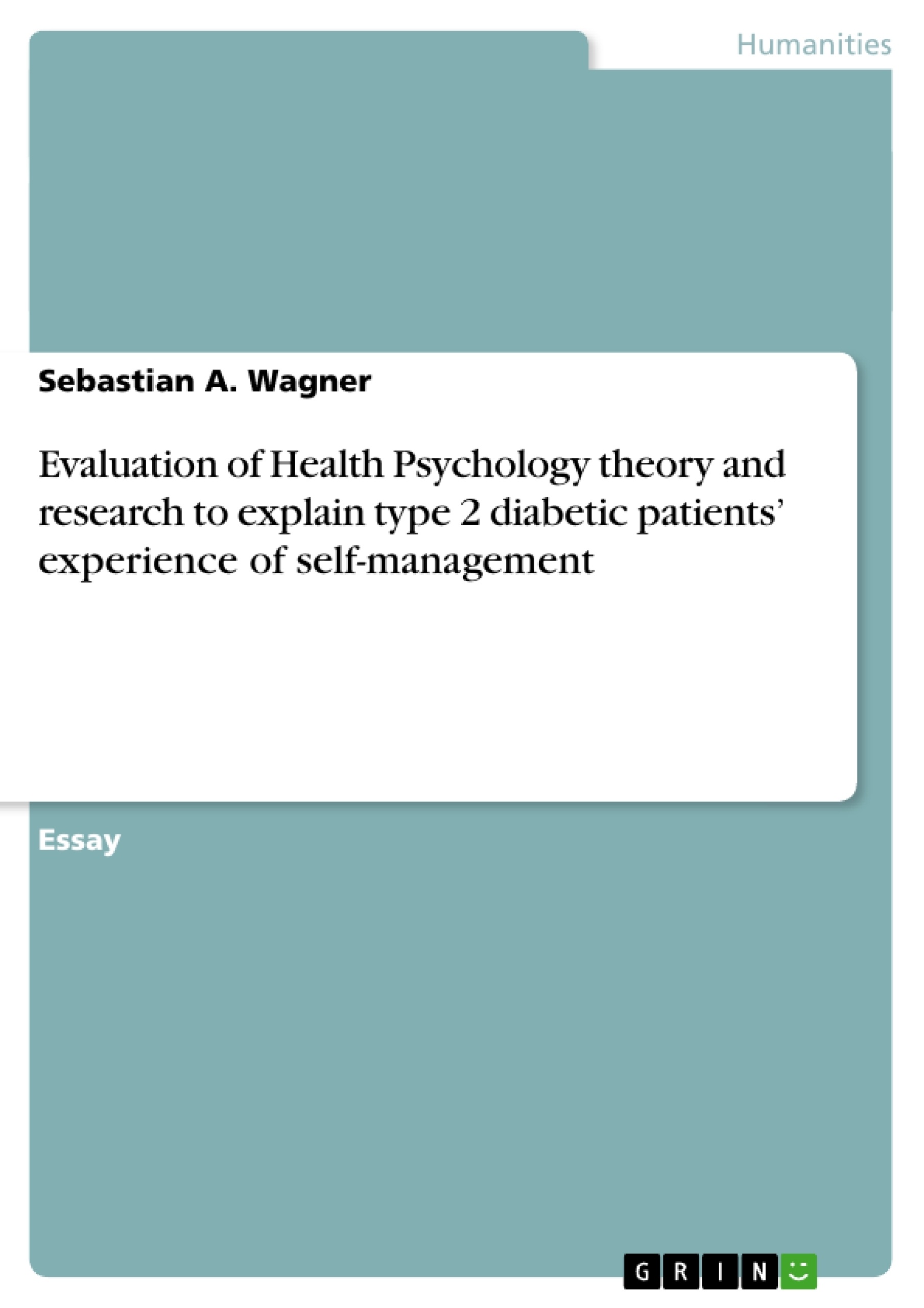This literature review is going to critically evaluate health psychology theories and research in order to explain type 2 diabetes patients’ experiences with SM (D2ESM); and will argue that these are influenced by a complex interaction of multiple psychological factors. The following broad themes were identified from reviewing the literature: Patients’ needs, characteristics and interventions. Before discussing these in detail, it will be outlined how models of illness cognitions and health beliefs are applied in the bespoken topic.
Inhaltsverzeichnis (Table of Contents)
- Introduction
- Health Psychology Models
- Patients' Characteristics
Zielsetzung und Themenschwerpunkte (Objectives and Key Themes)
This literature review critically examines health psychology theories and research to understand the experiences of type 2 diabetic patients (D2) in managing their condition (D2ESM). The review argues that these experiences are influenced by a complex interplay of psychological factors.
- The role of health belief models in explaining D2ESM
- The impact of patients' characteristics and beliefs on their self-management
- The influence of social support and illness representations on D2ESM
- The potential for interventions to improve D2ESM
- The need for further research to explore the complex interplay of psychological factors in D2ESM
Zusammenfassung der Kapitel (Chapter Summaries)
- Introduction: This section introduces the prevalence and implications of type 2 diabetes (D2), emphasizing the critical role of lifestyle and behavioral factors in managing the condition. It highlights the importance of self-management (SM) in preventing complications and explores the need for a deeper understanding of the psychological factors influencing D2ESM.
- Health Psychology Models: This chapter examines the application of the Health Belief Model (HBM) and the Self-Regulatory Model of Illness Cognitions (SRM) to D2ESM. It discusses the strengths and limitations of these models in explaining D2ESM and highlights the need for further research to address gaps in the literature.
- Patients' Characteristics: This chapter presents research findings on the characteristics of D2 patients and their impact on SM. It focuses on a study comparing low-income Caucasian and African American adults, highlighting the importance of factors such as knowledge, attitudes, and perceived barriers to physical activity. The chapter also discusses the limitations of the study in terms of theoretical framework and further research directions.
Schlüsselwörter (Keywords)
This review focuses on the interplay of psychological factors influencing type 2 diabetic patients' experiences with self-management (D2ESM). Key themes include health belief models, patients' characteristics, illness representations, social support, and interventions. The review emphasizes the need for further research to better understand the complexities of D2ESM and inform effective interventions.
Frequently Asked Questions
How does health psychology explain type 2 diabetes self-management?
It evaluates the psychological factors, such as beliefs and attitudes, that influence a patient's ability to maintain a healthy lifestyle.
What is the Health Belief Model (HBM) in the context of diabetes?
The HBM explains health behaviors based on perceived susceptibility, severity, benefits, and barriers to managing the condition.
How do illness representations affect a patient's experience?
The Self-Regulatory Model (SRM) suggests that how a patient mentally represents their illness (identity, cause, timeline) dictates their coping strategies.
What role does social support play in managing type 2 diabetes?
Social support is a critical psychological factor that can improve adherence to medication and dietary changes.
How do patient characteristics influence health behavior?
Factors like income level, ethnicity, and knowledge significantly impact perceived barriers to physical activity and self-care.
Why is self-management critical for diabetes?
Effective self-management is the primary way to prevent long-term complications such as cardiovascular disease or nerve damage.
- Citar trabajo
- Dipl.-Psych. (Univ.) - B.Sc. (F.C. Hon.) in Psych. Sebastian A. Wagner (Autor), 2007, Evaluation of Health Psychology theory and research to explain type 2 diabetic patients’ experience of self-management, Múnich, GRIN Verlag, https://www.grin.com/document/170539



